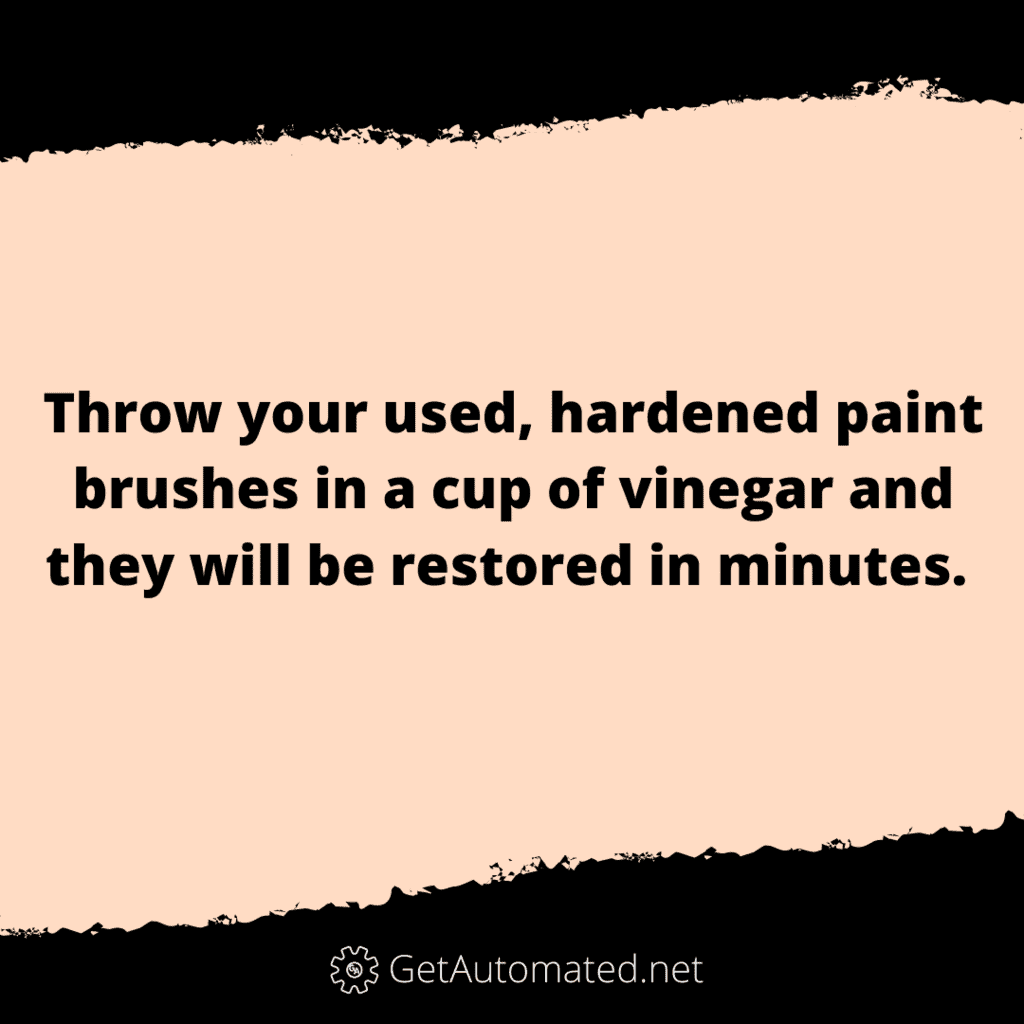
- If you don't want to use a pot from your kitchen, pick one up just for paint brushes at your local thrift store. Place your brush into the pot of vinegar. All of the paint covered areas of your brush should be covered with vinegar. If not, add more.
- After letting your brushes pre-soak, put the saucepan on the stove and turn up the heat. Use enough heat to let the brushes simmer in the vinegar. The heated vinegar will help moisturize and restore your paintbrushes to their original condition.
- Cold or hot vinegar solution for paint brush. How to clean paint brushes? – Cold or hot vinegar solution for paint brush / Image by Rudy and Peter Skitterians from Pixabay - Advertisement - A vinegar bath can help if the paintbrushes have dried on or are dry. The bristles are entirely immersed in the vinegar.
- Pour any white vinegar into a pot and bring it to a simmer or boil. Once heated, place your brush in the hot vinegar. Let sit for about 20 minutes. Wash them with warm, soapy water, and use your hands to remove the dried paint.
You pull a clean, fresh paintbrush out of the pile, and a smile stretches instantly across your face. There is simply no better feeling! Bupers manual article c 10306.

Wouldn’t it be amazing if you could keep your brushes in this good of shape for as long as possible? It may not come as a surprise, but all it takes is some regular care and maintenance.
Clean Hardened Paint Brush
Soak the brush with hardened paint in vinegar for an hour. Gothic 2 skidrow. If the bristles don’t bend.
But, while dirty brushes are the bane of every painter’s existence, they happen. Whether they are accidentally forgotten about after a long day in the studio or merely on their last leg, seasoned artists and brush makers have a few tricks up their sleeves for bringing your brushes back to life.

So, think twice before you pop that trashcan lid, and consider these twelve tips for caring for and salvaging your favorite brushes.
“Repeat the washing and rinsing process until the soap and water runs clear. Keep your water warm, but not hot, as hot water may cause any remaining paint to clot.” - Winsor & Newton
“Soaking your brushes in fabric softener periodically will help restore softness and pliability to their bristles, keeping them from becoming brittle and breaking off.” - Paint Nite
“You can use vegetable oil for cleaning a palette and dish soap and water for brushes. Just don’t let them sit in the water—it will ruin them. But, if they do lose shape, you can stick them in boiling water for a few seconds and they will reshape.” - Lori McNee, Fine Art Tips
“ Remove all excess paint with a soft rag or paper towel. Never let your brush rest on its head. There are many accessories available that will suspend your brush.” - Princeton Artist Brush Co.
“The most important thing to remember with regard to caring for your acrylic brushes is not to let the paint dry following use, as the paint is not soluble in this state and will produce a plastic-like dried texture.” - Winsor & Newton
“Soak oil paint-covered brushes for 5-10 minutes in baby oil (yes, baby oil). This gets a lot of paint and medium off before washing thoroughly with mild soap and warm water. “ - Teri Granger Martin
“The area near the ferrule is often the hardest to clean, but it's actually just as important for maintaining a brush's shape as the tip. Any paint residue that coats the bristles at their base will prevent them from coming together at the top.” - Craftsy

“If the ferrell gets gummed up, I was told that you can soak your brushes in rubbing alcohol for a couple of days and that will solve the problem.” - Carol McIntyre
“After washing with dish soap and water I finish the job as a usual rule with olive oil! You fight oil base with oil! Won't believe how much oil paint is removed from what I thought was a clean brush! The olive oil keeps the bristles soft as well!”
“Grab a glass cup and fill it about 1-2 inches deep with distilled white vinegar. Heat it in the microwave for 1-1.5 minutes then submerge your nasty paintbrushes into it… Take some dish soap (Dawn, Palmolive, etc.) and rinse off the brushes in warm soapy water.” - Crafty Morning
“If you have a painting project in mind, but the only paintbrushes you have are old, hard, and frayed, don’t go through the trouble of buying new ones. Revive old acrylic brushes with hair gel instead! Coat frayed bristles with any hair gel to mend the tips, then wash and soak them in fabric softener. They’ll be good as new!” - Paint Nite
“No matter what works for you, ensure that you reshape your brushes to the way they first looked when you bought them before you let them dry.” - Rosemary and Co
Hungry for more painting tips? Check out this smart advice for all painters we scored at the Plein Air Convention this year!
How To Clean Dried Paint Brushes With Vinegar
*Tips may work differently for acrylic and oil paint brushes. Make sure you double check any recommendations with the type of brush and paint you are using, as it varies with paint types.
Related Articles
Let us know what you think.
Please enable JavaScript to view the comments powered by Disqus.comments powered by Disqus
